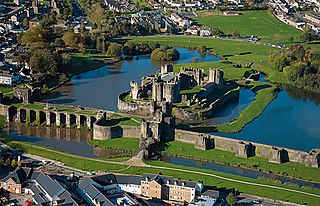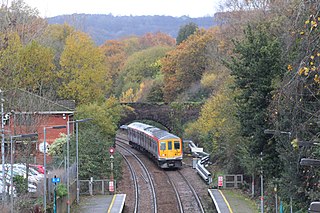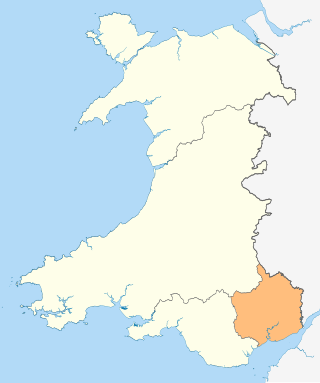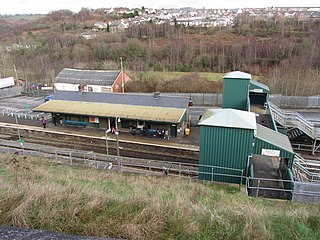
Caerphilly is a town and community in Wales. It is situated at the southern end of the Rhymney Valley.

Bargoed is a town and community in the Rhymney Valley, Wales, one of the South Wales Valleys. It lies on the Rhymney River in the county borough of Caerphilly. It straddles the ancient boundary of Glamorgan and Monmouthshire, with Bargoed lying in Glamorgan and Aberbargoed in Monmouthshire. 'Greater Bargoed', as defined by the local authority Caerphilly County Borough Council, consists of the towns of Bargoed and Aberbargoed and the village of Gilfach. The combined population of these settlements is about 13,000. The town's rugby club Bargoed RFC holds the world record for the most consecutive league wins in a row and was World Rugby magazine's team of the year in 2005. The town’s football team AFC Bargoed also have a rich history and finished second in the TERV Premier League 2022

Caerphilly County Borough is a county borough in the south-east of Wales. It is governed by Caerphilly County Borough Council.

Ystrad Mynach is a town in the Rhymney Valley in the Caerphilly County Borough, within the ancient county of Glamorgan, Wales, and is 5 miles (8.0 km) north of the town of Caerphilly. The urban area had a population of 19,204 in 2011. Before the Industrial Revolution and the coming of coal mining in the South Wales Coalfield the valley was rural and farmed. It lies in the community of Gelligaer.

The Rhymney line is a commuter rail line running from Cardiff Central through the Rhymney valley via Heath and Llanishen in the north of the city, to Caerphilly, Bargoed and Rhymney.

Gwent Police is a territorial police force in Wales, responsible for policing the local authority areas of Blaenau Gwent, Caerphilly, Monmouthshire, Newport and Torfaen.

Aberbargoed is a town in the County Borough of Caerphilly, Wales. Aberbargoed once contained the largest ever colliery waste tip in Europe, although this has now been reclaimed and turned into a country park. The town is within the historic boundaries of Monmouthshire.

Bargoed railway station serves the town of Bargoed in the county borough of Caerphilly, South Wales. It is a stop on the Rhymney branch of the Valley Lines network. It is located close to the Bargoed Interchange bus station.

Caerphilly railway station is a railway station serving the town of Caerphilly, south Wales. It is a stop on the Rhymney Line of the Valley Lines network. The station is located at Station Road in the south of the town. Facilities include a small shop and a ticket kiosk. A self-service ticket machine was installed near the entrance to the station on 22 December 2008. Several advertising murals depicting holiday travel in various parts of South Wales have been placed on the northbound side of the station in order to improve the 'look' of the station.

Rhymney Valley was one of six local government districts in Mid Glamorgan from 1974 to 1996.

Bedwas, Trethomas and Machen is a community and an electoral ward in the county borough of Caerphilly, constituting the villages of Machen, Trethomas, Bedwas, and Upper and Lower Graig-y-Rhacca. It lies in the Caerphilly Basin in the shadow of Mynydd y Grug and Mynydd Machen. All villages in the area grew as a result of the coal mining industry, which carries its legacy on today.
Penpedairheol is a village situated in the Rhymney Valleys, South Wales. It is located between Pengam, Gelligaer, Bargoed, Hengoed and Cefn Hengoed in the centre of Caerphilly borough, in the historic boundaries of Glamorgan. The translation of its names means the head of four roads.

Gwent is a preserved county and former local government county in southeast Wales. A county of Gwent was formed on 1 April 1974, under the Local Government Act 1972; it was named after the ancient Kingdom of Gwent. The authority was a successor to both the administrative county of Monmouthshire and the county borough of Newport.

Gelligaer is a community in the County Borough of Caerphilly, Wales, in the Rhymney River valley. As well as the village of Gelligaer, the community also includes the small towns of Hengoed and Ystrad Mynach. The population of the community at the 2011 census was 18,408.

Fochriw is a village in Caerphilly County Borough, Wales. It was well known for its neighbouring collieries, which employed nearly the entire local population in the early 20th century. It lies within the historic county boundaries of Glamorgan. The village appears as the backdrop on the BBC Wales sitcom High Hopes credits. The village's population was 1,250 in 2011.

Trelewis is a small village in the Taff Bargoed Valley of south-east Wales, currently located in the southern part of Merthyr Tydfil County Borough. It is a former mining village and together with nearby Bedlinog was until 1974 part of the Gelligaer Urban District Council area of the county of Glamorgan. The villages name means 'Lewis Town' and was named after the Lewis family who owned a farm on the area where the village is now built.

Energlyn & Churchill Park railway station is a railway station in Caerphilly, Wales, on the Rhymney Line. The northbound platform is in the Energlyn suburb of Caerphilly, whilst the southbound platform is in Churchill Park. The station is between Llanbradach and Aber.

Bargoed Interchange is a bus station located in the town centre of Bargoed, South Wales. It is situated near the High Street.

Cwm Bargoed railway station was near the village of Fochriw, in the Taff Bargoed valley of Caerphilly County Borough, Wales, from 1876 to 1964 on the Rhymney Railway. The station was 4 km (2.5 mi) east of Merthyr Tydfil, but was in a parallel valley.



















